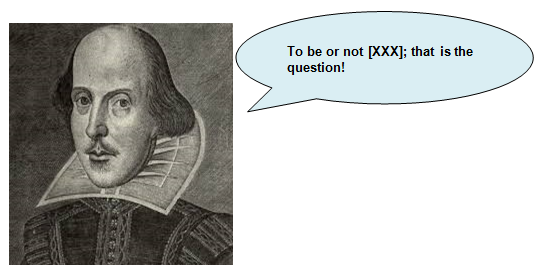
The Oxford online dictionary defines ‘ellipsis’ as:
‘The omission (deletion) of one or more words in order to avoid repetition.’
(Source: http://oxforddictionaries.com/definition/english/ellipsis)
Another definition of ellipsis is:
‘Omission of a word or short phrase easily understood in context.’
(Source: http://rhetoric.byu.edu/figures/E/ellipsis.htm)
Wherever possible, ellipsis is used to omit unnecessary words that have already been mentioned or are understood.
| ✘ | Three of those who were injured were protestors and the other two of those who were injured were pedestrians. |
This sentence is ‘wordy’ (having too many unnecessary words) and awkward and can be improved with ellipsis. Now consider the following version of the same sentence containing ellipsis:
| ✔ | Three of those [XXX] injured were protestors and the other two [XXX] pedestrians. |
The [XXX]s in this sentence mark the places where the writer used ellipsis to omit unnecessary words. Words such as who were / which were / who are (etc.) can often be deleted in order to make writing less wordy and more cohesive. Already mentioned words such as ‘of those [who were] injured’ in the first sentence may also be omitted to avoid wordiness. The second verb ‘were’ can also be omitted as it can be used for the nouns ‘protestors’ and ‘pedestrians’.
Consider the following example with the verb ‘have’:
| ✘ | She has more reason to study hard than I have reason to study hard. |
In this wordy, awkward sentence, the writer repeats the phrase ‘reason to study hard’ in the second half of the sentence, which makes it long and repetitive. Now consider the following version of the same sentence containing ellipsis:
| ✔ | She has more reason to study hard than I. |
In this version, the writer has omitted the phrase ‘reason to study hard’ from the second clause as it has been mentioned and is understood. This is often done with the verb ‘have’.
Consider this example with the verb ‘be’:
| ✘ | We thought it would be difficult to buy tickets for the concert, and it was difficult to buy tickets for the concert. |
Again, this sentence is too long and awkward and needs ellipsis. A better version would be:
| ✔ | We thought it would be difficult to buy tickets for the concert, and it was. |
Here, the writer has omitted the phrase ‘difficult to buy tickets’ as it was mentioned in the first clause and is understood. This is often done with the verb ‘be’ (am/ is/are/was/were).
Now consider another example with an auxiliary verb (could):
| ✘ | He worked on his dissertation as often as he could work on his dissertation. |
Once again, this sentence is repetitive and requires ellipsis. A better version of this sentence would therefore be:
| ✔ | He worked on his dissertation as often as he could. |
In this version, the writer has omitted the already mentioned and understood phrase ‘work on his dissertation’ from the second clause. This often occurs with ‘auxiliary’ verbs (can/could / will/would / may/might / do/did, etc). (When using modal auxiliaries for ellipsis, it is very important to use the right one(s), so do BE CAREFUL!)

